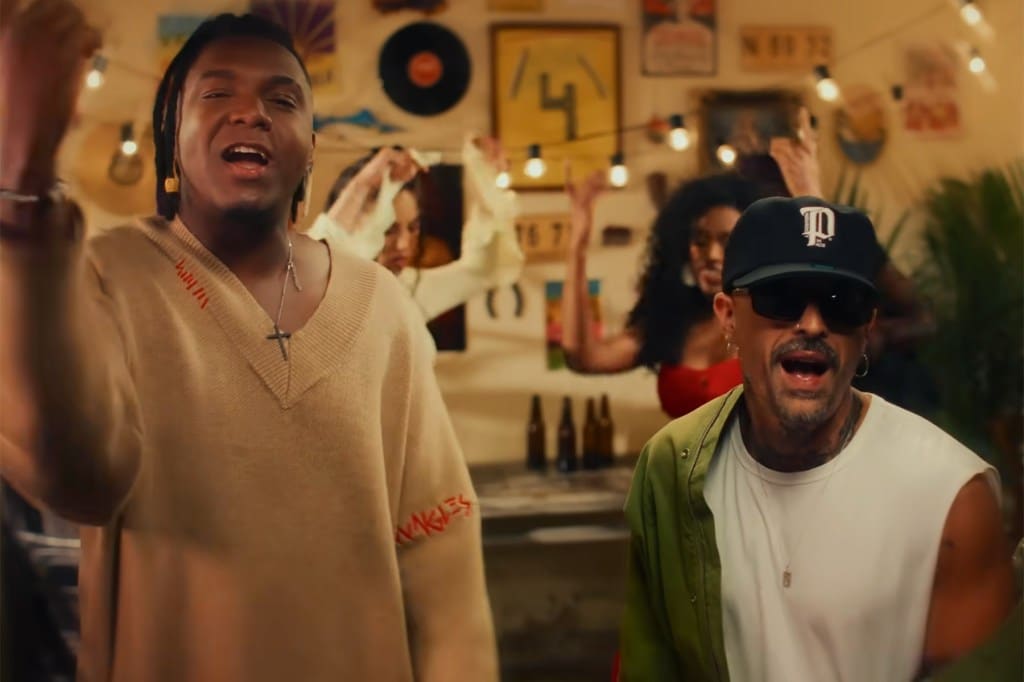genre latin
Page: 4
Trending on Billboard
This April, Maria Becerra underwent an emergency surgery for a second ectopic pregnancy that caused severe internal bleeding. For Becerra, it was “very difficult for me to do normal things,” like running, walking and even singing; however, it was this dark moment in her life that ultimately inspired her third studio album Quimera, out today (Nov. 20) under Warner Music Latina.
Explore
See latest videos, charts and news
Home to 17 songs produced by Xross, including the previously released singles “Corazón Vacío,” “Ramen Para Dos” with Paulo Londra, and “JOJO,” Quimera represents the “rollercoaster of emotions” that the Argentine experienced during her hospitalization and recuperation.
Inspired by the mythical creature, chimera, it also inspired four alter egos, each with a set of songs that best characterize them: Shanina, Gladys, Jojo, and Maite.
“The concept started in April, but I had just gone through a very difficult health situation, a huge loss,” she tells Billboard in an exclusive interview. “I was in a very hopeless, sad, and empty emotional state…when you don’t understand that something inside you isn’t working. You don’t understand that something you long for suddenly doesn’t happen. It was a harsh dose of reality. I went through many phases. When I was at my peak of recovery, that was the Jojo moment — unconsciously, everything was connected to my recovery and my emotional states.”
Below, Becerra opens up about her ultra-personal and very vulnerable project:
Maria Becerra
@javifotoman
In QUIMERA you have songs dating back to 2023: How long ago did this creative process begin?
The creative process, conceptually speaking, began in April of this year, with the idea of creating this new album. The truth is that songs like “Corazón Vacío,” “Romántica,” and “Slow it Down” are songs that have been around for a long time, songs that fascinate me, but I really didn’t want to force them onto an album where they didn’t fit. I’ve had “Slow it Down” for six years; it’s one of the first songs I ever wrote.
Why is the name of your album inspired by a creature from Greek mythology?
The Chimera is a monster made up of different animals: a goat, the wings of a dragon, the head of a lion—each animal represents a personality and a strength that contributes to this monster. There are precisely four animals, which are the alter egos that, in a way, act as Maria’s shield and together form this beautiful monster that is the Chimera. Each animal corresponds to a different alter ego.
Gladys is more grounded, more connected to reality; she is the goat. Shanina is the dragon, with Japanese culture, colors, and fantasy. Jojo is the lion, with that fiery personality. The Chimera has another beautiful meaning, which is what gave rise to this album—it’s a somewhat impossible dream to achieve, a distant dream that can’t be fulfilled. It had a lot of meaning for me, not only in music but also in my personal life.
How do you identify with these four alter egos?
All the alter egos are based on my personality. They’re like stages I’ve gone through that have marked me the most. I was Shanina at one point—very toxic, very jealous, very emotionally dependent. I was also Jojo with my excessive partying, my detachment from love, my antisocial nature. I was Gladys too, and Maite, very much so; I think she’s the one who has remained most present in my life—there’s an emotional and dramatic place that’s present in my songs.
In this album, you experiment a lot with tropical genres, including salsa and cumbia. Coming from the urban scene, was this a challenge?
Not at all! I’ve always made bachata from the beginning. Besides, these are genres I feel very connected to because I’m a huge fan of them—salsa, cumbia, bachata, I’ve always loved everything Latin. It was always played a lot at home, I’ve always had those influences, and honestly, I feel like that’s what helped me easily immerse myself in those genres and keep them so fresh in my ears.
You close the album with five songs like “Maria Becerra.” What makes these special?
Maria is the love story I have with my partner. “Slow it Down” is about those typical first encounters, where you feel a strong sexual connection with the person, very passionate, which is what happened in our first encounters with my partner, J Rei. We first connected through chat, through our thoughts and ideologies; that’s where we fell in love. “Slow it Down” represents everything I felt at that moment. “Pierdo la Cabeza” is about being on the verge of falling in love and not knowing how to explain what you’re feeling. In “Tatu,” I’m completely in love; it’s a real relationship. “Romántica” is about a relationship that has developed with a lot of love. And I close with “Mi Amor,” which is about something solid: trying to start a family, our engagement. It’s a song with him to share our experience.
There are 17 songs that convey different emotions: What was your mindset when you created this project?
My state of mind was a rollercoaster. The idea started in April, but I had just gone through a very complicated health situation, a huge loss. I was in a very hopeless, very sad, very empty emotional state. You don’t understand that something inside you isn’t working, you don’t understand that something you long for suddenly doesn’t happen. It was a reality check. I went through many states, the entire beginning of the album: April, May, June… in the months I spent recovering mentally and physically, it was all very sad, dark, very numb, and I don’t know at what point in my mind I associated all that pain with Shanina. She was the first alter ego where I channeled some of my pain with that madness, that cynicism, that darkness, like my thoughts.
As my condition and mood evolved, the other alter egos emerged — at the moment I felt empowered, I started to look good, to regain weight. It was very difficult for me to do normal things; running, walking, singing was incredibly hard after being intubated, regaining lung capacity. When I was at my peak recovery, that was the Jojo moment, unconsciously, everything was connected to my recovery and my emotional states.
Did you ever think about giving up music during your recovery?
It was the opposite. The first intrusive thought, more due to the physical aspect, was that I wouldn’t be able to tour. I was going to have to take a really long break—mental, vocal, and physical rest. It wasn’t throwing in the towel, but it was recognizing that I needed to take a break. And recognizing that I had to be away for months, but in terms of [quitting] music, I never even considered it.
On the contrary, although I did have my dark moments creatively, very sad and dark songs would come out, and I couldn’t get out of that place. That moment alarmed me, and well, being the anxious person I am — I was very vulnerable — I had a creative block, but I never thought about giving up music. The important thing is to let grief flow. I listened to myself a lot, I was very patient with myself, and I went with the flow.
Trending on Billboard
From lawyer to Latin Grammy winner, Mexican singer and songwriter Paloma Morphy shares what it feels like to be the “new girl in class,” and how her law studies inspired her new single “La Mexicana.”
Paloma Morphy: I studied law and left my job as a criminal defense attorney to give music a chance, which had always been my childhood dream. This was a big step for me, and I felt like the new girl in class, stepping into a world I’d only watched from afar.
Seeing all these artists in real life, after years of seeing them on a screen, was shocking, surreal and exciting. It filled me with mixed emotions, happiness, nervousness, excitement and, of course, a bit of impostor syndrome. I often found myself asking, “What am I doing here?” But deep down, I knew it was a dream come true.
When I learned I was nominated for best new artist, I was initially scared, assuming it would be a competitive atmosphere where people might side-eye me. However, to my surprise, everyone was incredibly supportive. It was a shared, natural experience. We were all in the same boat — nervous, excited and trying to put our best face forward. Many of us were experiencing this for the first time, which created a sense of camaraderie. We didn’t know what to expect from the week, but we supported one another and enjoyed meeting each other. It was genuinely a cool experience, and, honestly, I liked them all.
Recently, I released a song with a message for Mexico titled “La Mexicana.” It came out a few days ago, though I had written it some time back.
Reflecting on my journey, I had studied law and worked as a criminal lawyer before deciding to pursue music. I gave myself two years to see where this dream would take me. While working in prosecutor’s offices, I witnessed firsthand the systemic failure of addressing gender violence, how many complaints never even reached the investigation stage. This experience compelled me to write “La Mexicana,” a song inspired by what I saw and felt during that time.
Keep watching for more!
Trending on Billboard
Ricardo Montaner trains as if he were preparing to run a marathon. In February, the iconic Argentine-Venezuelan singer-songwriter will embark on an ambitious tour that will take him across Latin America, the United States, and Europe — a feat that will demand physical and vocal resilience. At the same time, he plans to release of two albums for 2026, he shares exclusively with Billboard Español.
“This tour is not just a return; it’s a renewal of vows,” Montaner says about El Último Regreso World Tour, which kicks off on Feb. 21 in Buenos Aires, Argentina. The trek is named after his latest love song, released on Nov, 6 under his label Hecho A Mano Music.
Dressed in sportswear following a physical conditioning routine at his home in Miami, the 68-year-old artist explains that this tour will take around 18 months. “I just signed perhaps one of the longest tours of my career, with more than 120 performances,” he notes. For this reason, the words “rest” or “retirement” aren’t on his mind. “I’m just a boy,” he jokes.
El Último Regreso World Tour aims to celebrate the artist’s bond with his audience and revisit his career spanning over four decades. The performer of anthems like “Me Va a Extrañar” and “Tan Enamorados” plans to include a couple of 25-minute medley blocks in this new show, featuring iconic songs from different eras. “I want everyone who attends to feel like I sang their song and not leave disappointed because I didn’t perform one or the other,” he says.
The tour begins in Argentina, with shows in the cities of Buenos Aires and Cordoba, and continues in Uruguay, Paraguay, Costa Rica, Colombia, and much of Mexico, where he will perform more than ten shows between April and May. “Mexico is the country where I’ve worked the most, and to cover it, you need to perform more than 15 times,” Montaner explains. Later, he will visit Ecuador, Peru and Chile, before moving on to the U.S. and the Dominican Republic in August and September.
El Último Regreso World Tour will also include a European leg in countries like Spain, France, and Italy. Meanwhile, Montaner will continue adding new music to his discography. The artist reveals he is working on an album featuring pop ballads and other genres, including two singles released this year, “Lo Que Te Dé La Gana” and “Si Tuviera Que Elegir” — the latter featuring his daughter Evaluna and his son-in-law Camilo. In January, a new single will arrive.
“I think that by the time we meet again, people will have heard the latest music, the songs I’ve released over the past two years,” he says, noting that he is simultaneously working on another LP featuring duets of his greatest hits — “a collection of my most iconic songs alongside my most cherished colleagues.”
This album, he adds, will also serve as an introduction to his legacy for younger generations. “I love re-recording my early albums, being able to share with young people what was the foundation of my entire career.”
With a career spanning over 40 years and 25 studio albums, Montaner is one of the most recognized performers in the Latin music scene. He boasts multiple accolades, including a Latin Grammy Lifetime Achievement Award, which he received in 2016, and the Latin AMA Legacy Award in 2024. On the Billboard charts, he has placed dozens of hits on Hot Latin Songs, including the No. 1s “La Cima del Cielo,” “Quisiera,” “Piel Adentro,” and “Castillo Azul,” as well as 17 sets on Top Latin Albums, three of which landed in the top 10.
For more information on the tour, click here.
Ricardo Montaner
Alex Pazmiño

Trending on Billboard Calvin Harris, John Summit and Peso Pluma are set to headline AT&T Playlist Live! on Jan. 17 and 18 in Miami Beach ahead of the College Football Playoff National Championship. The star-studded concert is free for fans, with doors opening at Lummus Park on Ocean Drive at 6 p.m. ET on both […]
Trending on Billboard
At the 2025 Latin Grammys, Paloma Morphy won the coveted best new artist award, where she was up against promising newcomers such as Alleh of Alleh y Yorghaki fame; Isadora, Chayanne’s talented daughter; and flamenco guitarist Yerai Cortés.
“I feel like the new girl in the classroom,” she told Billboard during Latin Grammys week in Las Vegas. “Seeing all these artists for the first time off-screen was quite shocking, but I’m so happy, excited, and nervous. It’s truly a dream come true. I was scared before coming, thinking it would be full of competition … but I realized we’re all in the same boat. We’re happy to meet each other and support one another.”
Hailing from Mexico City, Morphy discovered her passion for music at a very young age when she joined chorus and talent shows. Aware of her super power, there came a point in her life where she felt spiritless and did not see a career in music viable. So, instead, she pursued a career in law. Her love for music, however, was always present, and after uploading her songs on social media—just as a hobby—Morphy officially stepped into the music realm in 2022 with her debut single “La Idiota Soy Yo.”
“I quit my job as a criminal lawyer to pursue my childhood dream of making music,” she noted. “I said I’d give it two years to see what happens.”
And in those two years, Morphy has not only captivated with her indie-pop sound, charming vocals, and bubbly personality, but she also released her debut studio album, Au, under Sony Music México this year, and was a two-time nominee at the Latin Grammys, ultimately winning the 2025 best new artist trophy.
Paloma Morphy accepts the Best New Artist award onstage at the 26th Annual Latin GRAMMY Awards held at the MGM Grand Garden Arena on November 13, 2025 in Las Vegas, Nevada.
Christopher Polk
“I was very sad and unmotivated, and I don’t know where I got the strength to move forward, but I connected with my dream since I was little that I never thought could be real,” she expressed in the media center backstage on the evening she won.
Moreover, she reflected on her time as a lawyer, admitting to Billboard: “There’s a reason I endured five years of that incredibly boring career, but yes, it gives me a different perspective, and all my songs are based on that experience. So far, I haven’t been able to write about things I don’t feel deeply about.”
Below, learn more about this month’s Billboard Latin Artist on the Rise.
Name: Andrea Paloma Barrios Gomez Álvarez Morphy
Age: 25
Recommended Song: “la mexicana”
“I wrote this song because, during my time working at the prosecutor’s office, I realized how many reports of gender-based violence never even reached the investigation stage. From that perspective, I wrote a song to Mexico as if it were a person I love, because I love my country; it’s beautiful in so many ways, but in this song, I ask Mexico: Why don’t you love me the way I love you? It’s truly my way of raising my voice, and it’s made me reflect on how we can truly make a difference.”
Major Accomplishment: Winning best new artist at the 2025 Latin Grammys, and her debut album, Au, garnering over 28 million streams on Spotify since its release this March.
What’s Next: A new collaboration with Neto Péña and Robot95 releases on Thursday (Nov. 20), in addition to working on new music that she will release in 2026 leading up to her sophomore studio album
Trending on Billboard
Venesti and Mike Bahía take “Difícile,” their first partnership, to No. 1 on Billboard’s Latin Airplay chart (dated Nov. 22), as the song rallies 13-1 in its 11th week.
“Difícil” soars to No. 1 on the overall Latin radio ranking with 8.24 million audience impressions earned in the United States during the tracking week of Nov. 7-13 (up 55%), according to Luminate. Leading the song’s radio surge are Univision stations KVVF in San José, Calif., KQMR in Phoenix, and KAMA in Houston.
“We are No. 1 on Billboard with Venesti!” Mike Bahía shared with Billboard. “Thank you for the invitation, my friend. I am grateful to Chappell [Warner Chappell Music Latin] for bringing us together, grateful to Luis Salazar, the producer, and Samantha Cámara, one of the composers I love collaborating with. Beyond happy, this is sooo cool, pure fuel.”
“I would like to thank God, first of, because we are No. 1 on Billboard,” Venesti adds. “Grateful to Billboard for their consistent love, my radio crew in the States, my incredible fans, my team, AP Global Music, and Mike Bahía for believing in the song.”
Bahía achieves his first No. 1 on the Latin Airplay chart with “Difícile.” Plus, he becomes the sixth act to earn their inaugural chart-topper in 2025, joining Kapo, benny blanco, The Marías, Gerardo Coronel ‘El Jerry,’ and Morat.
Venesti, meanwhile, banks his third champ, after “Umaye” and “No Es Normal,” with Nacho and Maffio, both one-week rulers in 2023 and 2024, respectively.
Elsewehere, “Difícile” reaches new heights on Latin Pop Airplay, as the song climbs 3-1 for its week atop. This also marks Bahía’s first No. 1 there.
Trending on Billboard Bad Bunny‘s “Yonaguni” has surpassed the one billion views on YouTube, earning the Puerto Rican hitmaker his 18th music video to enter the Billion Views Club as a lead, featured artist or collaborator. Directed by Stillz, the visual captures a nostalgic Bad Bunny healing from a breakup but still missing his ex […]
Trending on Billboard
Beto Montenegro explains how the Caribbean mindset has shaped Rawayana’s eighth album.
Beto Montenegro: I think it’s about enjoying it, I don’t know. That speech was written that morning, so no, no, no, you don’t plan that much either. I feel very happy. I think it’s one of those songs, one of those special ones, right? That raise and do things, right? And influence in society and generate interesting debates. And today it’s recognized at the Latin Grammys. We didn’t expect it much. So, yes, like here processing the surprise, you know? How nice.
Interviewer: How would you say, now that we were talking, what was Rawayana’s process?
I think Rawayana’s process has been a … it’s been a very, very, very beautiful and very worked-on process, right? And of short steps, right? And of resistance, a lot of resistance, right? It wasn’t so much about speed.
Today I feel a little bit exposed, because there are many things that, from the beginning, were public, right? I haven’t been an artist who curated a lot and released things carefully, but rather things came out, and everything we’ve done was always exposed to a group of people that each time got bigger. So, yes, it’s been a process quite transparent with respect to the public, you know? You can see all our mistakes and all the successes and everything — everything is on the web, right?
From the beginning until today, everything feels … I feel very solid in some way because we’ve completed all the processes to get to where we are now, right? From the beginning, the slang, right? It’s there. And then there’s kind of been a tendency toward that for a while now, and circumstantially we were already there, like, very much communicating in that way.
Keep watching for more!

The sheer number of artist signings announced on a weekly basis makes it difficult to keep up, no matter how closely you pay attention to the industry news cycle. That’s why every other Tuesday, Billboard compiles the latest signings to labels, distributors, agencies, management companies and more, in an effort to provide a snapshot of the latest moves in the artist space, from household names to indie stars to emerging acts.
First up this week, UTA signed singer-songwriter, actress and model FKA twigs for global representation in all areas. Twigs most recently released the album Eusexua Afterglow, a follow-up to her acclaimed album Eusexua from earlier this year that just nabbed a Grammy nod for best dance/electronic album. She’s slated to perform at Coachella next April.
Renowned Mexican singer Lucero is embarking on a new chapter in her career with Seitrack Records, the record label division of Ocesa Seitrack. On Oct. 29, the star, who has more than 45 years of experience in TV, film and music, signed an agreement with Octavio Padilla, the company’s director. Ranchera music will be the focus of this new phase of her career, with an upcoming album produced by Aureo Baqueiro. — Tere Aguilera
Miami company Fundamentals, led by Horacio Rodríguez, signed Ecuadorian rising star Jombriel and his longtime collaborator and producer Jøtta. Hailing from Esmeraldas, Jombriel was featured in Billboard‘s On the Radar Latin earlier this year. In March, the 22-year-old earned his first No. 1 on the Billboard Argentina Hot 100 with the Ryan Castro-assisted remix of his viral hit “Parte & Choke,” also featuring Alex Krack and Jøtta. Jombriel’s breakthrough single, “Vitamina” with DFZM and Jøtta, has garnered more than 325 million Spotify streams, according to Fundamentals, and is included on his debut 2025 album, Jombriel de la Suerte. Jøtta, a rising creative force in the Latin music world, is the producer behind these chart-topping hits, which blend dancehall, reggaeton and tropical sounds. — Isabela Raygoza
Check out more recent artist signings below.
Mad Tsai (Rebellion Records)
Trending on Billboard
ROSALÍA makes history with an unprecedented feat, as she becomes the first artist to secure five No. 1s debuts across Billboard charts (dated Nov. 22). LUX, her fourth studio album, opens at No. 1 on Top Latin Albums, Top Latin Pop Albums, Classical Albums, Classical Crossover, and World Albums. The set also debuts at No. 4 on Billboard 200 chart, making her first top 10 on the overall chart.
Explore
See latest videos, charts and news
LUX opens with 46,000 equivalent album units earned in the United States on the tracking week ending Nov. 13, according to Luminate. While ROSALÍA scored two No. 1 albums on the Top Latin Pop Albums chart previously through El Mal Querer (2018) and Motomami (24 weeks at No. 1 between 2022-23), LUX marks the Spaniard’s first effort to reach No. 1 on Top Latin Albums and her first top 10 on the all-genre Billboard 200. It’s also her first title to reach Classical Albums, Classical Crossover and World Albums.
Out of LUX’s 46,000 total units in its opening week, streaming activity contributed 27,000 units, translating to 34.1 million on-demand official U.S. streams. Meanwhile, album sales accounted for 19,000, with minimal contribution from track-equivalent album (TEA) units.
Top Latin Albums’ Best: ROSALÍA achieves her strongest performance yet on the Top Latin Albums chart as LUX debuts at No. 1. This marks her best showing on the overall Latin albums ranking among three entries. Her 2018 album El Mal Querer peaked at No. 10, while Motomami climbed to No. 3 in 2022.
First Spanish-Born Woman to Top Classical Albums & Classical Crossover Albums Charts in Modern Era: While the Classical Albums and Classical Crossover Albums charts have featured numerous core Latin and Spanish-born artists over the years, until now, a Spanish-born woman had never claimed the top spot on either chart in the modern era (since Luminate’s electronically-tracked data began powering both charts in December 1993). Renowned Spain-born figures José Carreras and Plácido Domingo, and Venezuelan Gustavo Dudamel have all achieved No. 1s on the Classical Albums chart, with Carreras and Domingo also earning a No. 1 on the Crossover Albums chart in 1997.
With the arrival of LUX, ROSALÍA breaks new ground, becoming the first woman who is both Spanish-born and primarily a Latin recording artist, to achieve a No. 1 on both charts in the modern era.
First Spanish-Speaking Solo Woman to Reach No. 1 on the World Albums Chart: Nine acts who speak and predominantly perform in Spanish have previously reached No. 1 on the World Albums chart. Among those, Cuban ensemble Buena Vista Social Club (1999, 2015), Spanish artist Manu Chao (2007), Mexican duo Rodrigo y Gabriela (2007, 2009, 2014), Puerto Rican artist Residente (2017), Mexican musician Santana (2019), Spanish group Gipsy Kings (1990, 1994-1997, 2001, 2004, 2013), Colombian Pedro Ramaya Beltrán (2017), and Peruvian artists Ricardo Delgado and Mario Mendoza (both in 2017).With her album LUX, Rosalía becomes the first-ever Spanish-speaking solo woman to claim the top spot on the 25-position World Albums ranking.
Most Simultaneous Songs for a Latin Pop Act on Hot Latin Songs in Over a Year: ROSALÍA sets a new standard for Latin pop acts by placing 11 simultaneous songs on the Hot Latin Songs chart in 2025, which incorporates streaming data, radio airplay, and digital sales to rank songs. Prior, only one Latin pop artist had reached similar milestones in a single week: Kali Uchis, with 14 concurrent tracks in January 2024.
Starting at No. 3, “La Perla,” with Yahritza y Su Esencia, leads the new tracks with 4.8 million official on-demand streams. Plus, “Reliquia” the album’s second top 10 hit, debuts at No. 10 with 3.2 million official on-demand clicks during its opening week. With these two new top 10 entries, ROSALÍA captures her ninth top 10 on Hot Latin Songs.
Here’s a rundown of ROSALÍA’s LUX tracks on the Hot Latin Songs chart (dated Nov. 22):
No. 3, “La Perla,” Yahritza y Su EsenciaNo. 10, “Reliquia”No. 13, “Sexo, Violencia y Llantas”No. 15, “Porcelana”No. 17, “Dios Es Un Stalker”No. 23, “La Yugular”No. 25, “De Madrugá”No. 26, “Mundo Nuevo”No. 28, ‘Sauvignon Blanc”No. 30, “La Rumba Del Perdón,” with Estrella Morente & Silvia Pérez-CruzNo. 36, “Magnolias”

 State Champ Radio
State Champ Radio 






